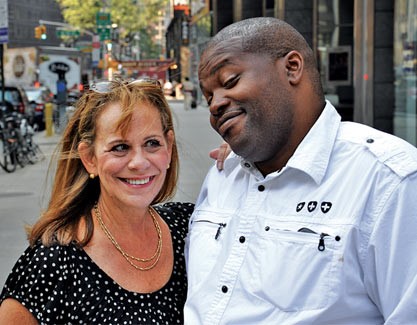
On a summer day in 1986, Lauren Schroff walked up to the intersection of 56th and Broadway in midtown Manhattan.
She was a single, 35-year-old marketing exec who was helping fuel USA Today’s meteoric rise to “the nation’s newspaper.”
As she prepared to cross the street an 11-year-old black youth, a panhandler, asked, “Miss, do you have any loose change?”
“No,” she answered, walking on. But halfway across the street – for reasons she still cannot explain – Schroff stopped. She turned back. “Are you hungry?” she asked the boy. “Yes,” said Maurice Mazyck.
Schroff suggested they have lunch at the McDonald’s on the corner. “Can I have a cheeseburger?” Maurice asked hopefully.
That was the beginning of an unusual friendship that has endured for more than three decades.
In her book An Invisible Thread, Schroff describes how she and Maurice agreed to meet again at the same corner the following Monday. And the Monday after that. Then came another 150 consecutive Mondays and numerous meetings in other settings over the years. During that time they learned a great deal about each other and about themselves.
It took Laura a while to grasp the reality of Maurice’s abject poverty.
His mother was a drug dealer and crack addict. His father, who lived in the neighborhood, was widely regarded as the toughest guy on the street. Ultimately he died of AIDS. Until he met Schroff, Maurice had never received a Christmas gift. The only two presents he had ever known were a toy truck when he was four, and a rolled joint from his grandmother when he was six.
Laura asked Maurice what he wanted to be when he grew up. He had never considered that question before, for the simple reason that he had never assumed he would actually grow up.
As she spent more Mondays with Maurice, Schroff gradually began to come to terms with the harshness of her own upbringing, including an alcoholic father who raged at his children and terrorized Laura’s mom.
Over time she offered Maurice the gift of stability: someone who promised to be a predictable presence in his life, who would not walk away when things got hard.
Today Maurice is a husband and a father. He lives in New York City, not far from where he grew up, and is working to break the cycles of poverty and hopelessness that afflict the lives of so many others.
Looking back, he is most grateful that Schroff began to make lunches for him on school days. She would put them in a brown paper bag and give them to the doorman at her Manhattan apartment, from whom Maurice would retrieve them. He recalls “the real meaning of lunch in a brown paper bag.” It was love – visible proof to the others at school that someone actually cared about him.
Schroff, who also still lives in the city, reflects that her relationship with Maurice is “the story of how two people who needed each other somehow became unlikely friends, against all odds. It is the story of the mysterious, unseen connections that exist between people who are destined to meet and how, if only we open our eyes and our hearts to them, these connections can be the great blessings of our lives.”
Concerning the day they first met at 56th and Broadway when he was 11 years old, Maurice says: “You know, at that moment she saved my life. Cause I was going down the wrong road, the wrong hill…The Lord sent me an angel. My angel was Laurie.”
And Schroff’s response? “He taught me how to live. He taught me about resilience, courage, friendship…”
Sometimes people imagine that when they step into the next world, there will be a kind of pop quiz: Can you name the 12 Minor Prophets and put them in the correct order? How would you define the Trinity? Who would provide the most interesting dinner conversation: Martin Luther, Mother Teresa, Thomas Aquinas, or Billy Graham?
But Jesus makes it clear that moment will have a significantly different focus.
He will say to those entering heaven: “Come, you who are blessed by my Father; take your inheritance, the kingdom prepared for you since the creation of the world. For I was hungry and you gave me something to eat, I was thirsty and you gave me something to drink, I was a stranger and you invited me in, I needed clothes and you clothed me, I was sick and you looked after me, I was in prison and you came to visit me” (Matthew 25:34-36).
Our love for the Least, the Last, and the Lost is dear to the heart of God.
And sometimes the most profound way to express love is a PBJ in a brown paper bag.
